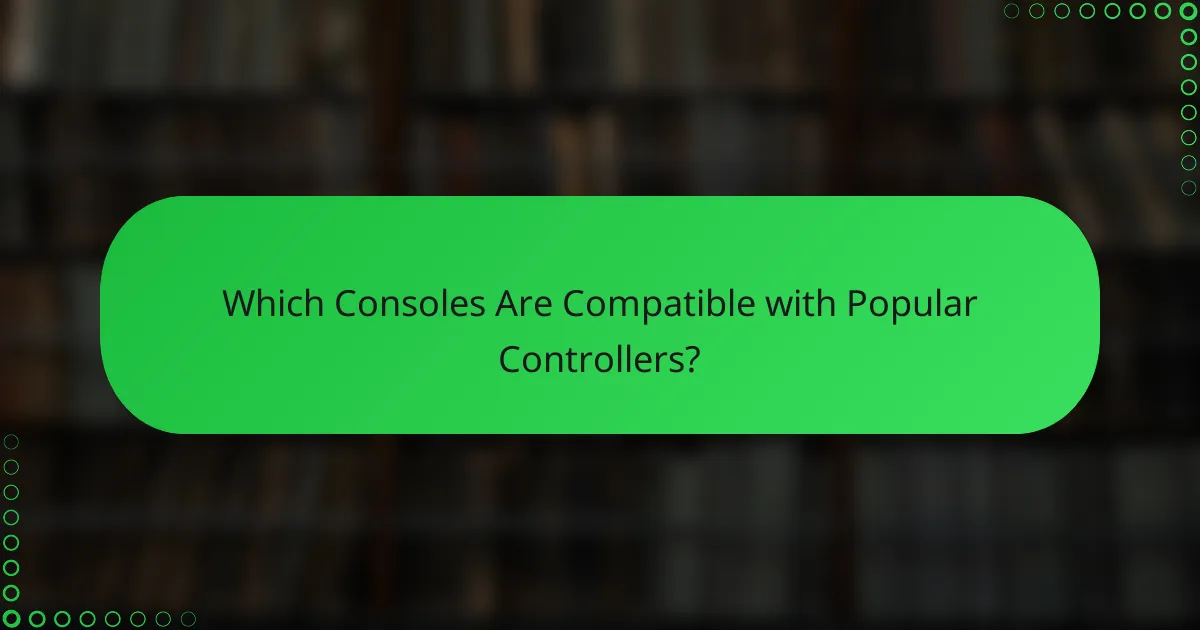Controller compatibility across gaming consoles plays a crucial role in enhancing user experience and providing flexibility for gamers. It’s important to consider specific controller models and console generations, as compatibility can vary significantly. For those interested in optimizing their setup, understanding Cloud Gaming Technology Compatibility is essential, along with features such as connection type, customization options, and comfort when selecting the right controller that aligns with personal gaming preferences.

Which Consoles Are Compatible with Popular Controllers?
Many popular controllers are compatible with various gaming consoles, enhancing user experience and flexibility. Compatibility often depends on the specific controller model and console generation, so it’s essential to check compatibility before making a purchase.
PlayStation 5 Compatibility
The PlayStation 5 supports a range of controllers, including the DualSense wireless controller, which offers advanced haptic feedback and adaptive triggers. Additionally, third-party controllers like the Razer Raiju and Hori Onyx are compatible, but features may vary.
To connect a non-DualSense controller, users can typically use Bluetooth or a USB cable. However, some features exclusive to the DualSense may not be available with third-party options.
XBOX Series X Compatibility
The Xbox Series X is compatible with the Xbox Wireless Controller, which features improved ergonomics and low-latency connectivity. Other controllers, such as the Xbox Elite Series 2 and various third-party options, also work well with this console.
Connecting controllers can be done via Bluetooth or USB-C. It’s advisable to ensure that the controller firmware is updated for optimal performance and compatibility.
Nintendo Switch Compatibility
The Nintendo Switch supports several controllers, including the Joy-Con and the Nintendo Switch Pro Controller. Additionally, third-party controllers like the 8BitDo SN30 Pro+ can connect wirelessly or via USB.
When using third-party controllers, check for compatibility with specific games, as some titles may only support official controllers. Connecting is straightforward, typically requiring pairing through the console’s settings.
PC Compatibility
Many popular controllers, including PlayStation and Xbox models, are compatible with PCs. Users can connect controllers via USB or Bluetooth, depending on the model. Steam has built-in support for various controllers, allowing for easy configuration.
For optimal performance, ensure that drivers are up to date and consider using software like Steam Input for customized settings. Some games may require specific controller types, so verify compatibility before playing.
Mobile Device Compatibility
Popular controllers can also connect to mobile devices, enhancing gameplay on smartphones and tablets. Many Bluetooth-enabled controllers, such as the Xbox Wireless Controller and PlayStation DualShock 4, work seamlessly with both iOS and Android devices.
To connect, enable Bluetooth on your mobile device and pair it with the controller. Be aware that not all games support controller input, so check game compatibility for the best experience.

What Features Should You Consider for Controller Compatibility?
When assessing controller compatibility, focus on features that enhance your gaming experience, such as connection type, customization options, and comfort. Understanding these aspects will help you choose a controller that fits your console and personal preferences.
Wired vs. Wireless Options
Wired controllers offer a direct connection to consoles, ensuring minimal latency and no need for batteries. They are often favored by competitive gamers for their reliability.
Wireless controllers provide freedom of movement and reduce cable clutter, making them ideal for casual gaming. However, they require battery management, which can be a drawback during long gaming sessions.
Button Mapping Features
Button mapping allows users to customize controller inputs, enhancing gameplay by tailoring controls to individual preferences. Many modern controllers support this feature, enabling gamers to assign specific functions to buttons.
Consider controllers that offer software for easy remapping, as this can significantly improve your gaming experience, especially in complex games where quick reflexes are essential.
Ergonomics and Comfort
Ergonomics play a crucial role in controller compatibility, as a comfortable grip can reduce fatigue during extended play. Look for controllers designed with contours that fit the hand well and have textured grips for better handling.
Testing controllers in-store or reading user reviews can provide insights into comfort levels, helping you avoid options that may cause discomfort over time.
Battery Life and Charging
Battery life is a key consideration for wireless controllers, with most offering several hours of gameplay on a full charge. Look for models that provide at least 10-20 hours of use to minimize interruptions.
Charging options vary, with some controllers using USB-C for quick charging, while others may come with a dedicated charging dock. Evaluate which method suits your gaming setup and lifestyle best.

How Do User Preferences Impact Controller Choices?
User preferences significantly influence controller choices, as gamers prioritize different features based on their gaming style and needs. Factors such as comfort, button layout, and additional functionalities can sway decisions between various controllers.
Professional Gamers’ Preferences
Professional gamers often seek controllers that offer precision and responsiveness. They typically prefer wired connections to minimize latency and may choose models with customizable buttons for quick access to in-game commands.
Many professionals also favor controllers that allow for adjustable sensitivity settings, enabling them to fine-tune their performance based on specific game requirements. Brands like Xbox Elite and SCUF are popular among competitive players for their advanced features.
Casual Gamers’ Preferences
Casual gamers usually prioritize comfort and ease of use over advanced features. They often opt for controllers that feel good in hand and have a straightforward layout, making gameplay enjoyable without a steep learning curve.
Wireless controllers are commonly favored by casual players for their convenience, allowing for a more relaxed gaming experience. Many also appreciate built-in features like motion controls or touchpads that enhance gameplay without complicating it.
Accessibility Features
Accessibility features in controllers are crucial for gamers with disabilities. Many modern controllers offer customizable layouts, adaptive buttons, and remappable controls to accommodate various needs.
For instance, the Xbox Adaptive Controller is designed specifically for gamers with limited mobility, allowing them to connect various external devices to create a personalized gaming setup. This inclusivity ensures that more players can enjoy gaming regardless of their physical abilities.
Customization Options
Customization options are a key consideration for many gamers, allowing them to tailor controllers to their preferences. Features like interchangeable thumbsticks, adjustable triggers, and programmable buttons enable users to create a setup that enhances their gaming experience.
Some controllers come with companion apps that allow for further adjustments, such as sensitivity settings and lighting effects. Gamers should consider their play style when choosing a controller with customization options to ensure it meets their specific needs.

What Are the Best Controllers for Each Console?
The best controllers for each console enhance gameplay and cater to user preferences. Key factors include ergonomics, features like customizable buttons, and compatibility with various games.
Top Controllers for PlayStation 5
The DualSense Wireless Controller is the standout choice for PlayStation 5, offering advanced haptic feedback and adaptive triggers that provide a more immersive gaming experience. Its ergonomic design fits comfortably in hand, making long gaming sessions more enjoyable.
For those seeking alternatives, the Razer Raiju Ultimate and the Hori Onyx Wireless Controller are excellent options. Both controllers feature customizable buttons and enhanced grip, catering to competitive gamers who need precision and responsiveness.
Top Controllers for XBOX Series X
The Xbox Wireless Controller is the best option for the Xbox Series X, known for its comfortable grip and responsive buttons. It supports Bluetooth connectivity, allowing seamless pairing with PCs and mobile devices.
Gamers looking for more features might consider the Xbox Elite Series 2 Controller. This premium option offers customizable profiles, interchangeable thumbsticks, and adjustable tension, making it ideal for serious gamers who want to tailor their experience.
Top Controllers for Nintendo Switch
The Nintendo Switch Pro Controller is widely regarded as the best controller for the Switch, providing a traditional layout and excellent battery life. Its motion controls and amiibo functionality enhance gameplay across various titles.
Alternatively, the Hori Split Pad Pro is a popular choice for handheld mode, offering larger grips and a more comfortable feel. This controller is particularly favored for extended play sessions, making it a great option for portable gaming.

What Are the Key Criteria for Selecting a Controller?
When selecting a controller, consider compatibility with your console, features that enhance gameplay, and personal preferences regarding ergonomics and design. These criteria will help you choose a controller that meets your gaming needs and enhances your overall experience.
Compatibility with Consoles
Compatibility is crucial when choosing a controller, as not all controllers work with every console. For example, PlayStation controllers typically work with PlayStation consoles, while Xbox controllers are designed for Xbox systems. Some third-party controllers offer cross-compatibility, but always check specifications before purchasing.
Additionally, consider whether you want a wired or wireless controller. Wired controllers often provide a more stable connection, while wireless options offer greater freedom of movement. Be aware of any potential latency differences, especially for competitive gaming.
Features That Enhance Gameplay
Controllers come with various features that can significantly enhance gameplay. Look for options like programmable buttons, adjustable sensitivity, and built-in motion controls. These features can provide a competitive edge or improve comfort during long gaming sessions.
Some controllers also include haptic feedback and adaptive triggers, which can create a more immersive gaming experience. Evaluate which features are most important to you based on the types of games you play.
User Preferences Regarding Ergonomics and Design
User preferences play a significant role in controller selection, particularly regarding ergonomics and design. A controller should feel comfortable in your hands and allow for easy access to buttons. Consider the weight, grip texture, and button layout when making your choice.
Many gamers prefer controllers that fit their hand size and grip style. Trying out different controllers in-store or reading user reviews can help you find one that feels right. Remember that a comfortable controller can enhance your gaming performance and enjoyment.
